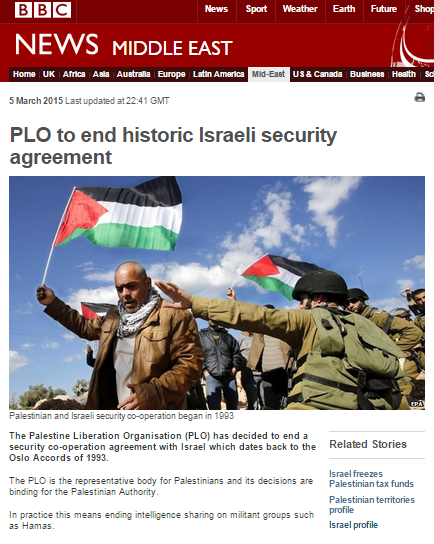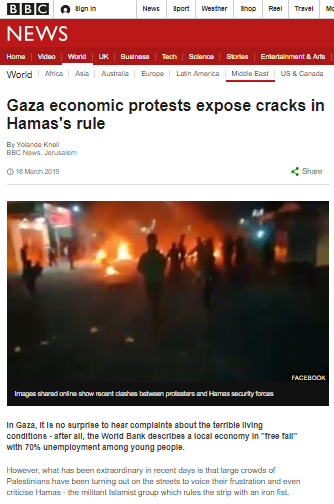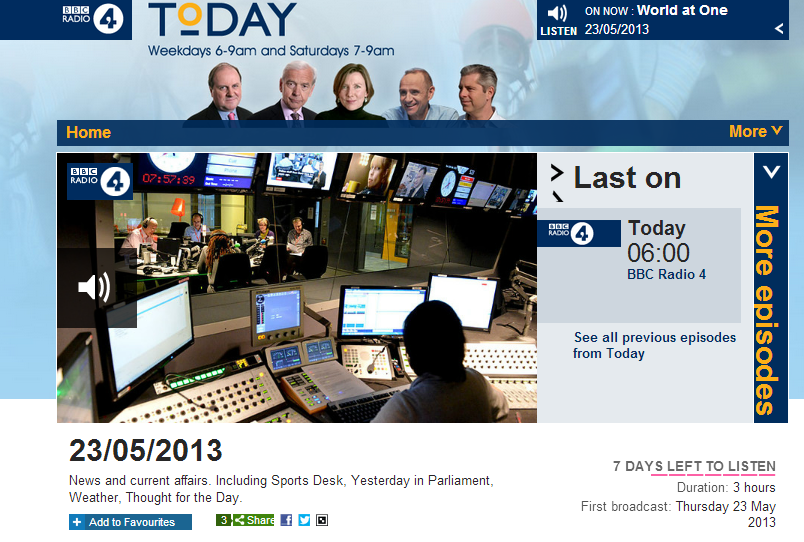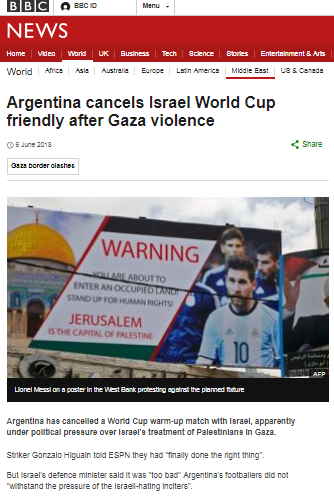March 5th saw the appearance of a report on the BBC News website’s Middle East page under the dramatic title “PLO to end historic Israeli security agreement” which opened by informing readers that:
“The Palestine Liberation Organisation (PLO) has decided to end a security co-operation agreement with Israel which dates back to the Oslo Accords of 1993.”
The report further stated:
“The PLO is the representative body for Palestinians and its decisions are binding for the Palestinian Authority. [….]
On Thursday the PLO said its executive committee would meet to implement the decision taken at the central council’s meeting in the West Bank town of Ramallah.[…]
Palestinian sources say that the decision is final […]”
However, the ‘done deal’ picture presented by the BBC would appear to be premature and misleading. The Times of Israel notes that:
“A source close to Palestinian Authority President Mahmoud Abbas told Israel Radio that the council’s decision was a recommendation only. Another Palestinian official said that Abbas must issue a presidential order ending the security cooperation with Israel.”
And in addition to the fact that in the meantime security coordination apparently continues as normal, PA officials have reportedly stated that:
“…President Mahmoud Abbas will not cut off security cooperation with Israel in the West Bank until after Israeli national elections on March 17 and only if another Netanyahu-led government refuses to transfer tax funds to the PA…”
Of course this is far from the first time that such a move has been threatened by various Palestinian officials: the same thing happened last month, last year and on numerous other occasions in the past. And that is all the more reason why the BBC should be able to provide its audiences with informative and relevant analysis on the topic of what such a move would mean for the Palestinian Authority and for the ordinary people living under its control.
Instead, readers of this article got the following analysis from the BBC Jerusalem Bureau’s Kevin Connolly:
Whilst parroting the Hamas line and claiming that an end to security cooperation would “be a blow to Israeli security”, Connolly notably avoids all discussion of the potential effects of such a decision on day-to-day issues such as the number of security checkpoints (which have been dramatically reduced in recent years) and on the wider subject of the chances of the Palestinian Authority’s survival without Israeli security cooperation. As Khaled Abu Toameh wrote in January of this year:
“Abbas is lucky that the Israeli security forces are still operating in the West Bank, including inside cities and towns controlled by the Palestinian Authority. Were it not for the IDF and various branches of the Israeli security establishment, Hamas, Islamic Jihad and Islamic State would have toppled the Palestinian Authority and beheaded Abbas and his officials a long time ago.”
And as the same writer noted last September:
“Abbas will be able to rein in Hamas in the West Bank only if he pursues security coordination with Israel. […]
Abbas and the Palestinian Authority would not be able to survive for one day in the West Bank without the presence of the IDF, especially given Hamas’s rising popularity among Palestinians in the aftermath of the war.”
Whether or not the Palestinian president (who of course also heads the PLO and its largest faction Fatah – although the BBC neglects to mention that in its report) will eventually issue that presidential order to end security cooperation with Israel remains to be seen but if he does not, BBC audiences will remain unaware of the factors lying behind that decision and if he does, they will be ill-informed with regard to that choice’s effects on future regional developments.





